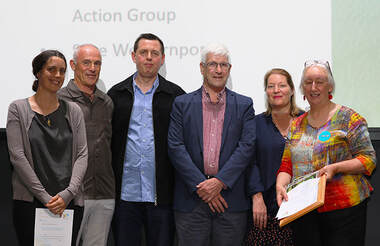 Western Port defenders Meredith Hayes, left, Graeme Burgan, Dale Stohr, Jeff Nottle and Karri Giles with Environment Victoria’s former director Linda Parlane.
Western Port defenders Meredith Hayes, left, Graeme Burgan, Dale Stohr, Jeff Nottle and Karri Giles with Environment Victoria’s former director Linda Parlane. WHILE climate activists are rattling the Prime Minister, Phillip Island’s eco warriors have drawn praise for decades of action to stop the industrialisation of Western Port.
At Environment Victoria’s 50th anniversary celebrations in Melbourne last week, the Phillip Island Conservation Society won the community environment award for a long-term contribution to conservation in Victoria
The citation noted the group’s “resilience in the face of repeated attempts to destroy the local environment at Western Port …Your achievements serve as an example of what we can all achieve with courage and persistence”.
| “This year, with a focus on 50 years of history, we would like to award the generations of campaigners who have defended Western Port Bay from development,” Environment Victoria’s former director Linda Parlane said when she presented the award. “The wetlands of Western Port Bay have been targeted for industrial development since the 1960s. Victorian Premier Henry Bolte wanted Western Port Bay to be the ‘Ruhr of Victoria’, named after the heavily industrialised valley in Germany. “We would like to recognise the incredible contribution to protecting Westernport Bay over the years by the Phillip Island Conservation Society and the Preserve Western Port Action Group, Western Port Protections Council and the Save Westernport Group.” Incorporating three marine national parks, a large portion of the bay is designated a Ramsar site under the Convention on Wetlands of International Importance. UNESCO has declared it a biosphere reserve. In 2013, when the Liberal National State Government announced that the Port of Hastings would become Australia’s biggest container port, PICS established an action group – Preserve Western Port (PWP) – to campaign against the port project. | What next for bay?
|
But the battle for Western Port is never over. PWP is now playing a support role in a new campaign against a proposal by energy giant AGL for a liquid gas terminal at Crib Point, across the bay from Cowes.
The Post asked PICS president Jeff Nottle to reflect on the earlier successful campaign against the container port and the role of activists.
How hopeful were you that you could stop the port?
The committee were always optimistic that the community, politicians and ultimately Infrastructure Victoria and others would see the flaws presented by the LNP State Government in relation to the proposed container port. Personally I remained confident that sound economic, environmental and social analysis would prevail.
What worked and what didn’t?
We were supported by Facebook followers, public forums, letters and donations from supporters and key stakeholder groups, clubs and councillors who supported our objective.
While we were non-political, we supported independent candidates in the 2014 state election, including Clare Le Serve who ran on an anti-container port ticket. Several thousand people signed online petitions against the container port.
We maintained a core management committee that consisted of around 15 people. Many of the management committee liaised with specific interest groups. Kevin Chambers, for example, looked after recreational fishers and spoke with around a dozen clubs around Western Port.
Is the battle ever over?
The battle against environmental and commercial exploitation never ceases. As long as the costs of natural resource exploitation and adverse environmental and social impacts are not measured in business cases, they do not fully reflect the costs to our community. I remain optimistic that the tide will turn as community sentiment insists that we take a more holistic view of what we are doing to our environment.
What do you think of the PM's proposal to curb "environmental activism"?
It’s not simply an erosion of our democratic principles and freedom of speech, it is seemingly another attempt to stop voices that are seen to be against the thinking of the current Federal Government. This is a trend with cuts to the ABC, targeting of journalists, scientists, community groups and now apparently wanting to legislate against individuals expressing an interest where banks, super funds and other companies with custody of our money invest in, as seen by the recent attack by the Government on the activist group Market Forces. [Mr Nottle stresses that these are his views and not PICS’s.]
Here we go again, by Anne Davie, December 6, 2013